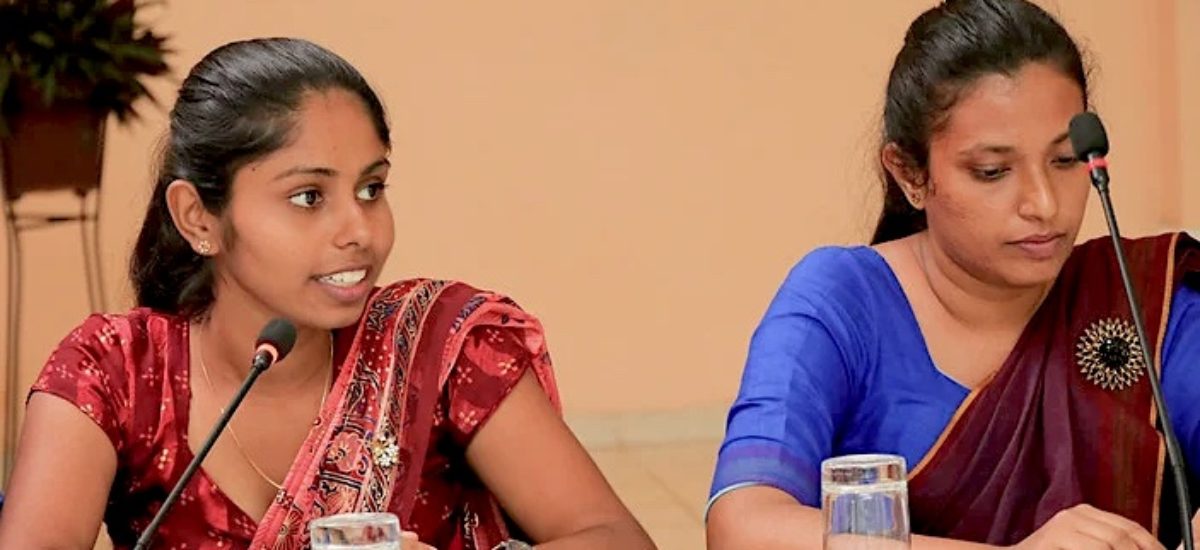Photo courtesy of womenforpolitics
It is an enduring stain on Sri Lanka’s democracy and gender equality that only 4.8 percent of parliamentarians are women despite their high literacy rate and educational levels. To correct this imbalance, proactive action is needed by women and men.
Women had the right to vote when universal franchise was granted to all males and females over the age of 21 in 1931. Before that, under the Donoughmore Constitution voting rights were given to a section of the elite but women from these families were excluded. Women had to fight for the right to vote, presenting a memorandum to the Donoughmore Commission demanding their right to vote, which resulted in universal franchise.
Two women members of the State Council were elected in 1931, constituting 4 percent of total members. One woman was elected to State Council in 1934 and until 1947 there were no women in the State Council. The first parliament of the country in 1947 had 95 members of whom three were women representing leftist political parties. The percentage of women in parliament for the 77 years from 1947 to 2024 has increased only by 2.7 percent.
The Association of War Affected Women (AWAW) with support from the National Peace Council and PAFFREL organized an event to advocate to all the presidential candidates and political parties to ensure a 25% quota for women in parliament. At the meeting, a statement was issued outlining the need for affirmative action to increase women’s representation in parliament and setting out the reasons who women should participate in politics.
- Women consist 52% of the country’s population and 56% of the total voters.
- Women’s equal participation is guaranteed not only by the Constitution but also through signing of all international instruments and normative frameworks.
- Good governance means making decisions with the equal participation of women and men. To fulfill the other aspects of good governance such as transparency and accountability, women’s participation is essential.
- Women’s leadership can create a conducive environment for change. If women can actively participate in politics, democratic institutions will be strengthened through transparency and upholding social values.
- Women’s participation in politics provides them with opportunities to demonstrate their leadership qualities. In most of the village level organizations and societies the membership consists largely of women and women participate in large numbers in the meetings of such organizations. Political participation is essential to develop the leadership qualities of such women.
- Due to the 25% quota for women in local government in 2016, women in local government bodies throughout the country showed a significant positive impact in areas such as sanitation, environment conservation, maintenance of maternity centres and library services.
- Parliament not only formulates the policies of the country but also functions as the main decision making body. Because of the lack of a system to enable half of the population of the country to participate in these vital decision making process, Sri Lanka has suffered as a country not only economically but also socially.
- The system change called for by the youth of the country during the 2022 struggle can only be made effective through enhancing women’s direct participation in parliamentary politics.
- It is essential to have women’s participation in decision making from foreign policies to economy management in order for Sri Lanka to come out of the economical set back it is facing but also to walk together with the rapid developing South Asian countries taking in to account not only the global trends but also the geopolitical realities of the day.
- The most important asset of a country is its future generation therefore it is essential that at least 25% women are in parliament who will influence the nurture of law abiding disciplined citizens.
Groundviews spoke founder of AWAW, Visaka Dharmadasa, about the barriers women face in politics and what difference they can make.
Why are women reluctant to enter politics?
One of the factors is political violence, which has played a crucial role for women to hesitate in participating. Another reason is that politics in our part of the world is lucrative; it is not a service. Therefore there is huge competition to earn money and men don’t want to give that up. It is also an issue for women to get nominations because parties are not democratic within their own systems. That is why we need affirmative action to get more women candidates and more women elected to parliament. We have been advocating for a long time to get women a quota and finally we were able to get a 25 percent quota for local government councils. This has resulted in a significant number of women coming in.
What difference has the increase of women in local government made?
Women have brought a lot of significant differences for their in councils from corruption reduction to the establishment of committees, improvement in education and methodologies. At a bare minimum there are now better washrooms.
In countries such as Rwanda and Sweden, women are well represented in parliament. Has this been reflected in the way the countries are governed?
Woman played a significant role in developing Rwanda after their civil war. In Sweden, they have changed foreign policy. There has been better governance when women are in power and are in decision making positions. Corruption becomes less. Women can change political culture; they can force men to behave better. Men and women have different strengths and weaknesses that can be used for betterment of the country. In Sri Lanka men haven’t been able to come together and improve the country. Let’s have a cabinet of all who are capable. We need equal participation.

